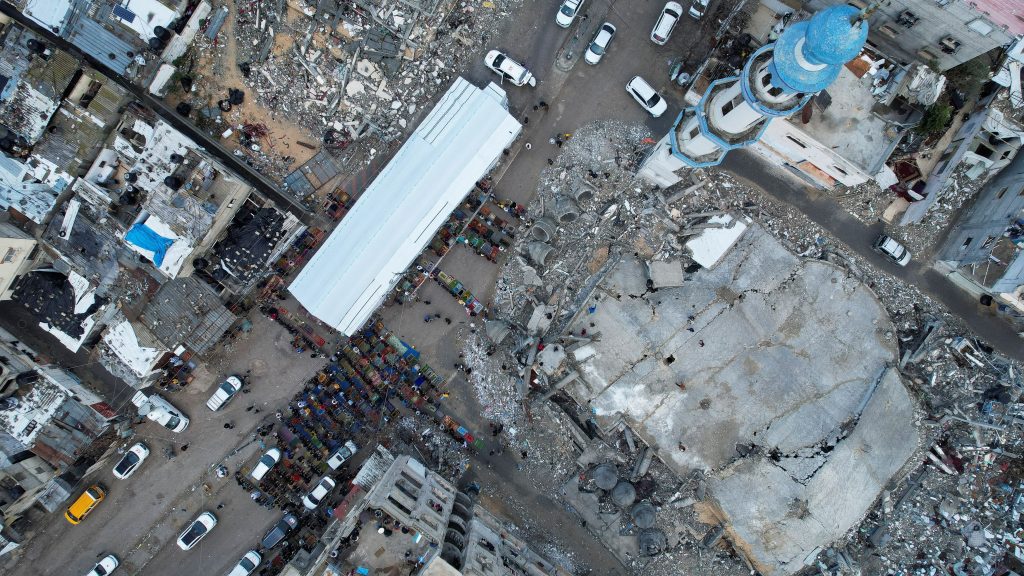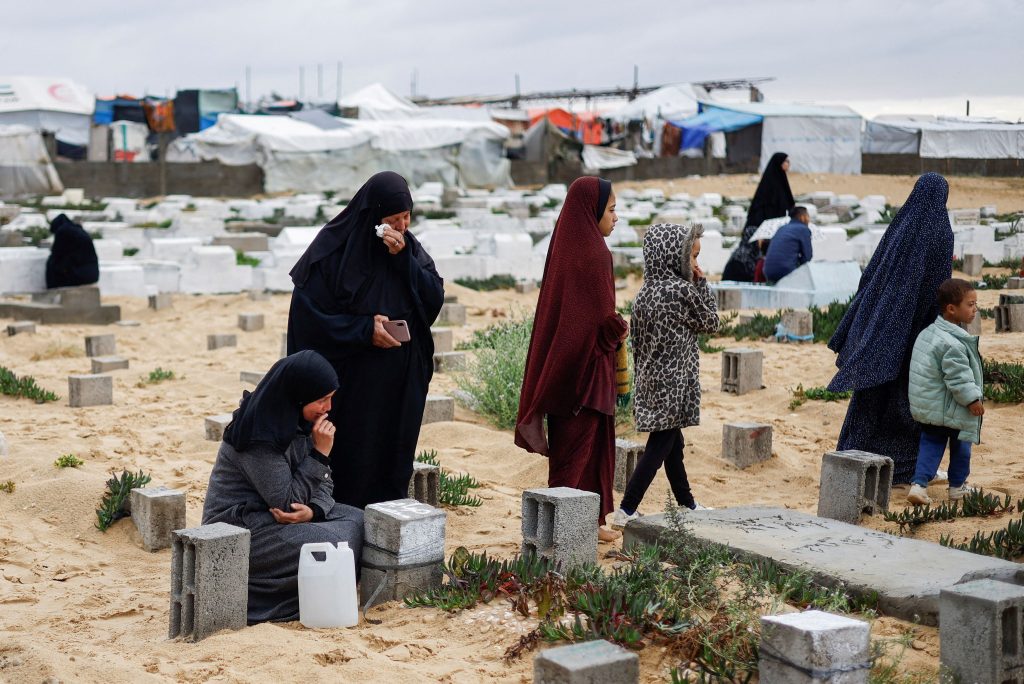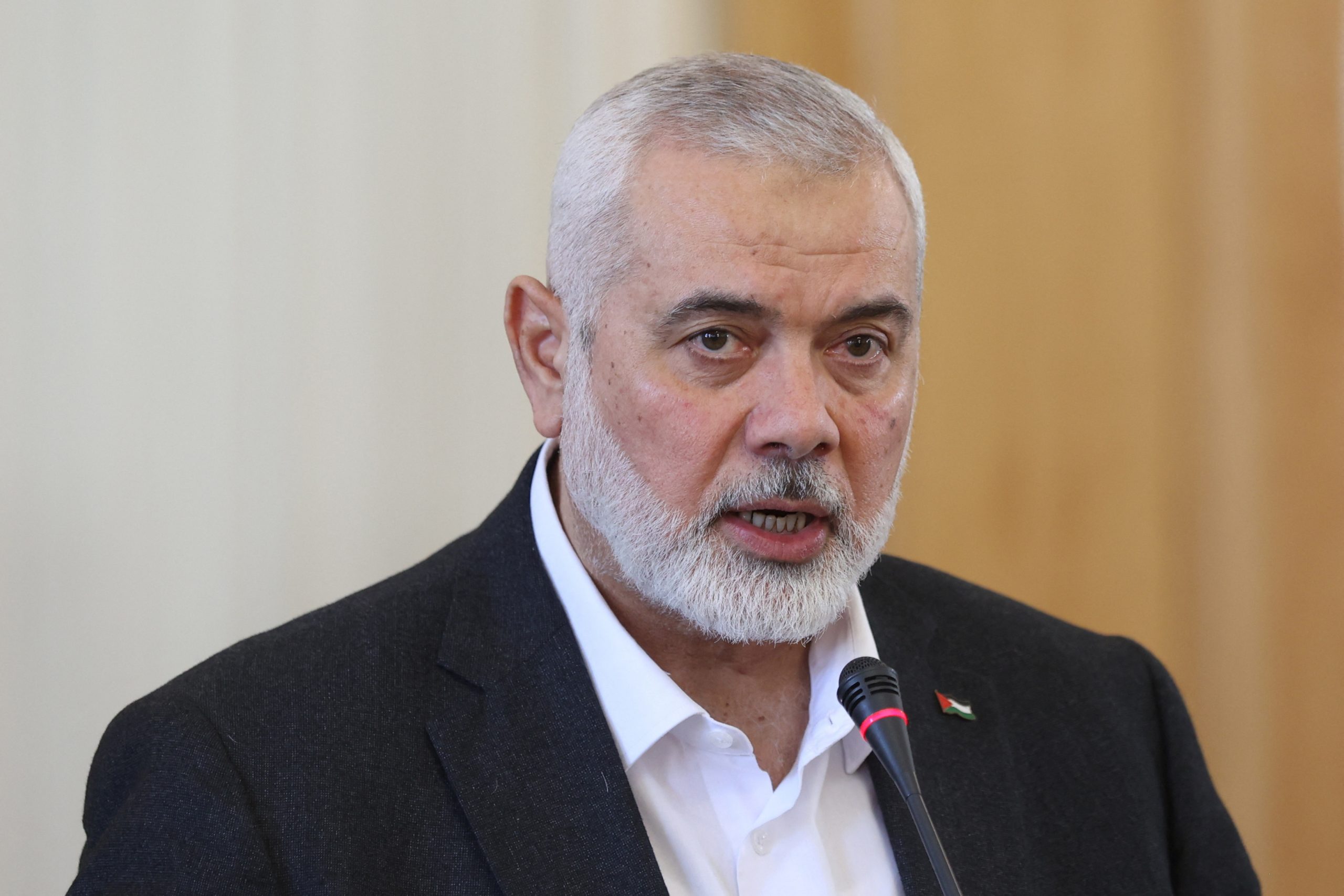Israeli airstrikes killed three adult sons of the head of Hamas’s political leadership on Wednesday, the first day of the Muslim holiday of Eid-al-Fitr, in an attack that could complicate a U.S.-led plan for a cease-fire in the six-month-old conflict in Gaza.
Israel said its warplanes struck three sons of Ismail Haniyeh in Gaza because they were members of Hamas’s military wing. Hamas said seven people died in the strike, including four of Haniyeh’s grandchildren. The group said the strikes hit a car in the Al-Shati refugee camp in northern Gaza that was making social visits for Eid, the holiday marking the end of the holy month of Ramadan .
“I thank God for this honor that he bestowed upon us with the martyrdom of my three sons and some grandchildren,” Haniyeh said in a video statement posted on X by Qatar-based broadcaster Al Jazeera.
Israel and Hamas named the three men as Hazem Ismail Haniyeh, Amir Ismail Haniyeh and Muhammad Ismail Haniyeh. Hamas officials denied they were members of Hamas. Haniyeh, whose Qatar-based political bureau shares power with a military wing in Gaza, has 10 other children, these officials said.
The killing of Haniyeh’s sons on a Muslim holiday could increase diplomatic pressure on Israel, which is negotiating the terms of a temporary cease-fire with Hamas. The group has largely rejected the U.S. plan, mediators said earlier Wednesday. Hamas said it would instead put forward its own road map for a permanent end to the war with Israel.
The dismissal illustrates the wide disagreement between the two parties on the contours of a deal and reflects Hamas’s growing confidence that diplomatic and domestic pressure on Israel to end the war gives the U.S.-designated terrorist group the upper hand in negotiations.
Hamas is seeking a permanent cease-fire and the full withdrawal of Israeli soldiers from Gaza in return for the release of hostages held in the strip. Israel has expressed openness to negotiating on the U.S. proposal for a temporary truce but wants the option of continuing its military campaign afterward.
It is unclear whether the deaths will significantly change the dynamics of negotiations because decision-making over the war has been more narrowly focused on the Hamas leader in Gaza, Yahya Sinwar , and the group’s military wing.
Haniyeh heads Hamas’s Doha-based political leadership, a group that is normally made up of roughly 15 people at any one time and determines Hamas’s military and political direction via consensus.
Haniyeh said the deaths of his sons on Wednesday wouldn’t affect the group’s negotiating stance. “The enemy is delusional if it thinks that by killing my sons, we will change our positions,” he said in a statement posted on Hamas’s Telegram account.

A drone view shows Palestinians holding Eid al-Fitr prayers by the ruins of al-Farouk mosque, amid the ongoing conflict between Israel and Palestinian Islamist group Hamas, in Rafah, in the southern Gaza Strip April 10, 2024. REUTERS/Shadi Tabatibi
The Israeli military’s decision to kill Haniyeh’s sons despite the possibility of destabilizing the cease-fire talks reflects Israel’s modus operandi in this war of killing high-value targets at the risk of damaging its other strategic aims.
Iran blamed Israel for an airstrike in Damascus at the start of the month that killed senior Iranian military officials in what Iran said was a diplomatic facility. The strike threatened to spark direct conflict between Israel and Iran when the U.S. is pushing for a de-escalation in the region.
Israeli strikes have killed the relatives of other senior Hamas leaders in this war and in previous conflicts. In December, an Israeli strike killed the son of Marwan Issa, the No. 3 official in Gaza . Last month, Israeli officials said Issa was killed in an airstrike that hit a central Gaza Strip refugee camp in its military campaign to kill anyone involved in the Oct. 7 attack on Israel.
Some Middle Eastern leaders sent condolences to Haniyeh, including Turkish President Recep Tayyip Erdogan , Iranian President Ebrahim Raisi and Mahmoud Abbas , the leader of the Palestinian Authority and one of Haniyeh’s political rivals .
The U.S. plan for a cease-fire, presented by Central Intelligence Agency Director William Burns to officials from Israel, Hamas, Qatar and Egypt in Cairo, calls for a six-week cease-fire in Gaza. During the pause in fighting, Hamas would release 40 of the hostages the group is holding in the enclave in exchange for 900 Palestinian prisoners from Israel’s jails, including 100 serving long sentences on terrorism-related charges, the plan said. Many of the 133 hostages held in Gaza are believed dead.
Israel’s war cabinet—made up of Prime Minister Benjamin Netanyahu , Defense Minister Yoav Gallant and a former head of the Israeli military, Benny Gantz —met Tuesday evening to discuss the U.S. proposal, before they then talked it through with a broader group of ministers.
A senior Israeli official familiar with the negotiations said Wednesday morning that Israel was open to using the U.S. proposal as a basis for talks, but that the plan is seen as favoring Hamas. Israeli officials view the proposal’s plan for the return of Palestinian civilians to northern Gaza and the ratio of prisoners to hostages as major concessions.
But there is a majority in the government that would vote to ratify a deal, even if it involves tough concessions on Israel’s part, the Israeli official said. If Hamas provides a counterproposal that moves negotiations forward, the two sides would be able to enter into serious negotiations, the official said.
Hamas officials told mediators in discussions this week in Cairo that their main issue with the U.S. plan was that it made no reference to an end to the war.
Under an earlier proposal, Hamas said it would release hostages who were women, children and elderly in return for the release of some Palestinians in Israeli jails, the withdrawal of Israeli soldiers from parts of Gaza, the increased entry of aid and the return of free movement of Palestinians around the strip.
In a second phase of this deal, Hamas would release other hostages in return for a full Israeli withdrawal from the strip. In a final step, Hamas wants Gaza to be reconstructed and the U.S., United Nations and other countries to act as guarantors of the agreement and the permanent end of the conflict.
Israel has said it is open to negotiating on these points but wants to avoid free movement of Gazans before a permanent end in fighting, to stop Hamas from regrouping in areas where Israel has already routed the group.
Israel launched its military campaign in Gaza after a Hamas attack on Oct. 7 that Israeli officials say killed some 1,200 people in Israel, most of them civilians. More than 33,000 Palestinians, most of them women and children, have been killed since the Israeli offensive began, according to Palestinian health officials, whose figures don’t distinguish between combatants and civilians.

Palestinian women visit graves of people who were killed in the ongoing conflict between Israel and Palestinian Islamist group Hamas, on the day of Eid al-Fitr, in Rafah, in the southern Gaza Strip April 10, 2024. REUTERS/Mohammed Salem TPX IMAGES OF THE DAY
Israel is under pressure from the U.S. and other allies to wrap up its military campaign and ease a deepening humanitarian crisis in the enclave. Calls for a cease-fire have increased since the Israeli military hit an aid convoy last week, killing seven humanitarian workers . Israel said the military wrongly identified the aid workers’ cars as hostile targets and that its troops lacked the evidence to order the strikes.
Israel in recent days has increased the level of aid flowing into Gaza to ease a hunger crisis there . The Israeli military’s humanitarian coordination unit said Wednesday that about 400 trucks a day had entered the strip in the past few days. That compares with a daily average of roughly 121 trucks during the war, according to a U.N. tracker. Before the war, Gaza received about 600 trucks of commercial goods and aid a day.
Israel’s defense minister said Wednesday that Israel is aiming to send up to 500 trucks of humanitarian aid daily to Gaza in the near future. “Let me say loud and clear—the defense establishment takes the United States very seriously,” Gallant said.
Write to Summer Said at summer.said@wsj.com , Dov Lieber at dov.lieber@wsj.com and Rory Jones at Rory.Jones@wsj.com



